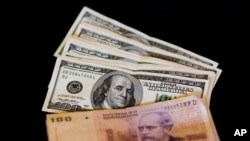Argentina's promises to defend its beleaguered peso gained credibility on Tuesday after the central bank poured $112 million of its reserves into dollar auctions, helping to boost the currency about 0.5% a day after steep losses.
In three interventions in the foreign exchange market, the bank acted in concert with statements from officials saying the government's top priority was to stabilize the peso after it lost 18% of its value against the U.S. dollar last week.
"The interventions pushed the peso through the 55-per-dollar barrier," to 54.50 pesos to the greenback, Gustavo Quintana, foreign exchange trader with Buenos Aires brokerage PR Corredores de Cambio, told Reuters.
The recession- and inflation-racked country was hit by a wave of uncertainty following an Aug. 11 primary election in which business-friendly President Mauricio Macri got thumped by center-left Peronist challenger Alberto Fernandez, who emerged the clear front-runner ahead of the Oct. 27 general election.
Minutes after being sworn in by Macri on Tuesday, Treasury Minister Hernan Lacunza said the government will stand by the peso and stick to its goal of erasing its primary fiscal deficit, despite a series of tax cuts and spending measures announced last week aimed at spurring growth.
"We want to leave a solid economic platform for whichever candidate wins" the presidential election, said Lacunza, former economy chief for Buenos Aires province. He told a press conference that Argentina had a primary fiscal surplus in July and he expected a surplus in August as well.
Traders said the peso rallied to close at 54.74 per dollar after falling 1.2 percent in early trade. Local over-the-counter bonds and the Merval stock index remained in negative territory, still stung by the downgrade late on Friday of Argentina's sovereign debt by ratings agencies Fitch and Standard & Poor's.
Monday was a holiday in Argentina, forcing investors to wait until Tuesday to react.
Nicolas Dujovne, the former treasury minister, quit on Saturday, saying he believed the country needed "significant renewal" of its economic team.
Macri, struggling to revive his campaign for a second term, is betting the new treasury chief can help stabilize the economy.
Last week Macri, smarting from his primary election loss, announced a cut in taxes on food and personal income along with increased welfare spending. The measures raised concern his administration will miss fiscal targets agreed with the International Monetary Fund as part of a $57 billion loan deal.
Fernandez told local radio he was concerned about the state of government finances that he might inherit if he wins the presidency and takes office in December.Macri's emergency relief measures were creating "a fiscal hole," Fernandez said.
Those measures will have a slight negative fiscal effect, but not enough to further hurt the country's credit rating, James McCormack, Fitch's head of sovereign ratings, said on Tuesday.
IMF watching
"We are closely following recent developments in Argentina and are in ongoing dialogue with the authorities as they work on their policy plans to address the difficult situation that the country is facing," the IMF said in a statement.
"An IMF staff team will travel to Buenos Aires soon," said the statement, which was signed by IMF spokesman Gerry Rice.
The IMF's next review of Argentina's economy on Sept. 15 should provide a sign of whether the lender of last resort still thinks the country can pay its debt obligations. Government bonds denominated in dollars are harder to pay when the peso weakens.
A crunch point will come in the second quarter of 2020, when Argentina is scheduled to make $20 billion in debt repayments, up sharply from $5.6 billion in the first quarter of next year.
Central bank chief Guido Sandleris told reporters on Tuesday the bank would continue to sell reserves in an effort to halt the peso's slide.
Including last week's interventions, the bank had auctioned off $615 million in dollar reserves as of Tuesday afternoon, traders said.
